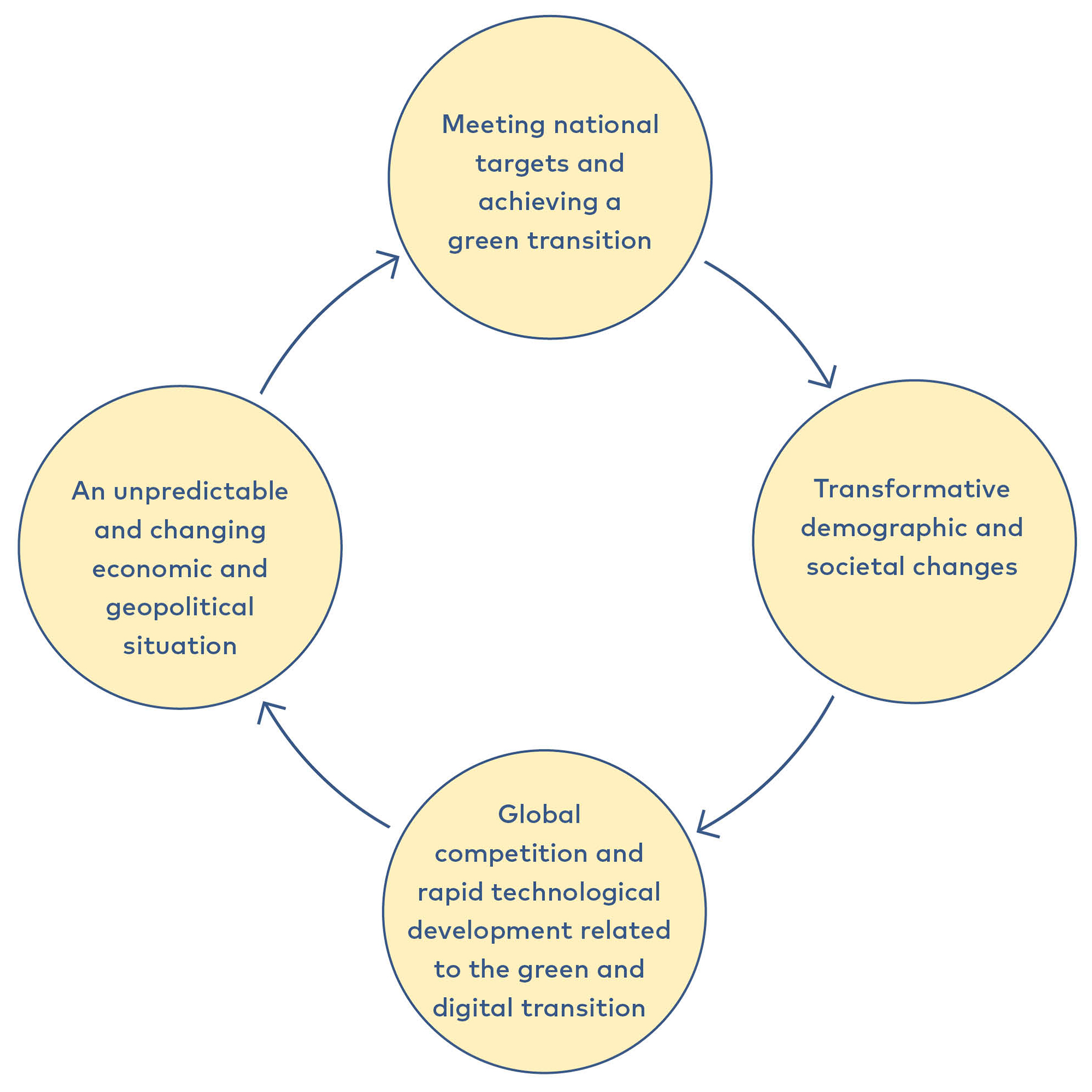Political Priorities

Challenges and opportunities in the business sector
The principle challenges in this sector ahead of 2030 are strongly linked to a number of global and societal challenges.
Climate objectives and environmental considerations
In order to achieve national climate goals, it is essential that the green transition be secured and accelerated. Meaningful action on climate change requires new approaches to innovation that can facilitate the rapid technological development that is the primary driving force for the green and digital transition and for growth in the Nordic Region. Nordic solutions and knowledge can help to reduce emissions in the Nordic Region and assist other nations in addressing climate change. The extensive transition that is required places a number of new demands on the business sector. Through greater co-operation around innovative, green and sustainable solutions, as well as greater integration across the region, the Nordic Region can ensure that Nordic companies have the competitiveness to generate growth and create profitable jobs that can maintain current living standards in the region. As part of the co-operation, it will be necessary to address common vulnerabilities and also strengthen the region’s position as a green pioneer region.
Global competition and rapid technological development
Nordic businesses are increasingly exposed to global competition. This applies not least to green solutions, which are in demand at a global level, but also in terms of digital products and services which are influenced to a much lesser degree by national borders and the need for transportation. Digitisation is a central topic in relation to technological development, and this is true across all sectors. Digital technologies have already exerted a transformative effect on the economy and business sector in the Nordic Region, in both the private and public spheres. The rapid development of artificial intelligence (AI) and automation are examples of this. This development will require a great deal of adaptability from the business sector, which will need to take a targeted approach to the use and development of digital solutions.
Geopolitical challenges
Geopolitical challenges have become central to business policy and have significant political and economic consequences. Among other things, these consequences take the form of higher inflation and economic downturn. The uncertain geopolitical situation makes global supply chains vulnerable and hampers the availability of critical raw materials. This increases regionalisation and directs attention towards the Nordic Region’s access to critical resources, supply chains and the skills needed to create and maintain new and green value chains that can generate business opportunities and enable growth. The new geopolitical reality poses particular challenges for the Nordic countries, given they are reliant on open international trade and investments. That openness has been altered by geopolitical tensions, increasing trade barriers and national state-support measures which create unequal conditions for competition. Together, the Nordic countries can leverage common positions of strength and address vulnerabilities for Nordic industries.
Demographics and societal change
The Nordic Region is facing transformative demographic and societal changes which are placing ever greater levels of pressure on the welfare and healthcare systems of the Nordic Region. By 2040, 5.6 million Nordic citizens will be over the age of 70.
Helsengren, M.B. et al. (2022). Business Case for Sharing Nordic Health Data. EY, Vista Analyse AS and Rosaldo OY on behalf of Nordic innovation.
op.cit. p. 14.
Nordic added value in the co-operation programme’s priorities
Nordic added value is a key criterion for evaluating the relevance and efficiency of Nordic co-operation.
Nordic added value is the value that results from initiatives beyond the value that would otherwise be generated at the national level. Nordic added value may include measures that create links, reduce obstacles and fragmentation, amass resources and competencies, realise unused potential or create synergies.
European Commission. (2011) The Added Value of the EU Budget. Commission Staff Working Paper. SEC (2011) 867 final. 2–4.
Business policy co-operation in the Nordic Region must generate clear added value for the Nordic countries and complement their work at the national and EU levels. In order to boost levels of Nordic added value, the Nordic Region must aim to increase understanding of and co-operation around how national positions of strength can better complement one another within value chains and ecosystems across national borders and sectors. The Nordic Region shares common values and complementary industrial advantages which create good conditions for the establishment of strong clusters and secure, sustainable value chains that support Nordic added value. Nordic co-operation can enable a faster transition in which common challenges are met by common initiatives.
In order to boost levels of Nordic added value, the Nordic Region must aim to increase understanding of and co-operation around how national positions of strength can better complement one another within value chains and ecosystems across national borders and sectors.
Cross-sectoral cooperation
The co-operation programme for business policy and its goals have touchpoints in common with several other policy areas which are partly outside of the sector’s area of responsibility. This can be clearly seen in some of the challenges faced by the Nordic business sector, but it is also an important consideration in relation to the growth potential of Nordic businesses. This includes areas such as access to skills, the use of new technologies and digitisation, the use and consumption of data and health and welfare solutions. The Nordic Council of Ministers for Sustainable Growth shall seek co-operation opportunities with other Councils of Ministers in areas where interdisciplinary collaboration can contribute to Vision 2030 and the ambitions of the co-operation programme.
Goals and sub-goals
The Council of Ministers for Sustainable Growth has adopted goals and sub-goals for the work to be undertaken in the 2025–2030 period. The political priorities establish the framework for activities in the policy area of Nordic co-operation. This means that the goals form the basis for the initiatives to be implemented by the sector.